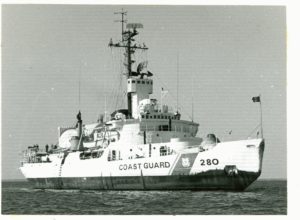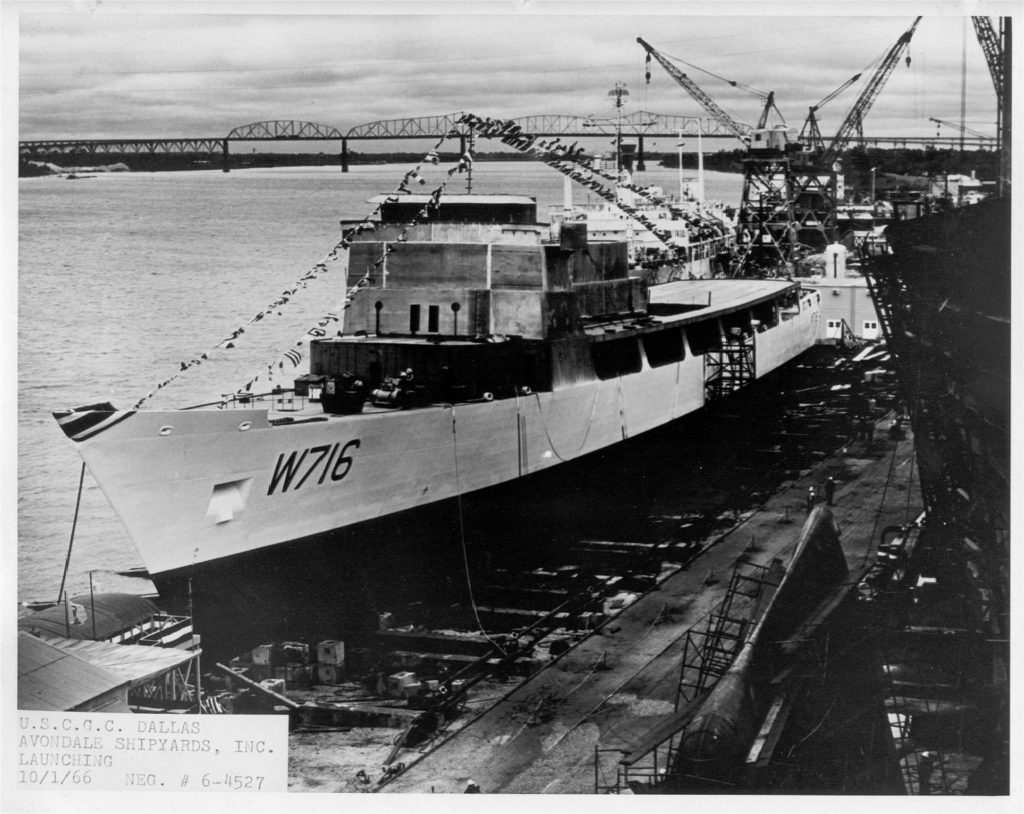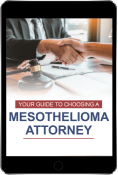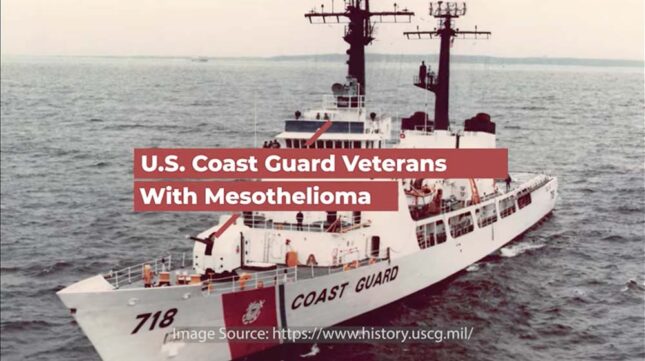Veterans who served in the U.S. Coast Guard from the 1930s to the early 1980s are at risk of developing asbestos-related diseases like mesothelioma. Due to the heavy use of asbestos on military ships, many service members were routinely exposed to the deadly material. Financial and health care benefits are available to eligible Coast Guard veterans with mesothelioma.
Mesothelioma and Coast Guard Veterans

Men and women who served in the U.S. Coast Guard at any time between World War II and the early 1990s may be at risk of developing mesothelioma, asbestosis, lung cancer, or another asbestos-related disease.
It takes 10-50 years for mesothelioma to develop after initial asbestos exposure, meaning its first symptoms usually appear well after the veteran served in the military.
If you served in the Coast Guard and were diagnosed with mesothelioma, you can pursue financial and medical benefits through the U.S. Department of Veterans Affairs (VA). You may also qualify for legal compensation to help pay for treatment and provide support for your family.
Get a Free Veterans Packet to learn more about accessing VA benefits.
Resources for Mesothelioma and Coast Guard Veterans
Financial VA Benefits
The VA offers benefits designed to relieve the financial burden of living with mesothelioma for victims and their loved ones. VA officers and accredited lawyers can help you file your VA claim.
Some eligibility requirements for VA benefits include:
- Being an honorably discharged veteran
- Providing a detailed report of your asbestos exposure
- Showing that over 50% of the exposure occurred during military service
Mesothelioma has a 100% disability rating according to the VA. This means that former Coast Guard service members are usually eligible for the maximum payout for disability compensation.
Other VA benefits may be available based on income, number of dependents, or caregiver needs.
VA Health Care Benefits
The VA health care system has some of the best mesothelioma surgeons in the world. Many mesothelioma Coast Guard veterans can get free treatment for this cancer, from these specialists.
Legal Compensation
Manufacturers made and sold asbestos-containing products to the U.S. Coast Guard, even though they knew of the deadly risks. These companies could be held financially responsible if you developed an asbestos-related disease after being exposed to their products.
You may be eligible to receive compensation from an asbestos trust fund or a mesothelioma lawsuit. Both legal options may allow you and your family to access the financial help and justice you deserve.
Asbestos lawsuits are not filed against the U.S. Coast Guard. Instead, they are filed against the manufacturers responsible for your cancer.
Many manufacturers of asbestos-based products filed for bankruptcy to avoid being sued. However, they were forced to set up asbestos trust funds to help pay victims for the harm they caused. These funds have over $30 billion, and you may qualify to receive a portion of this money.
Learn more about accessing legal compensation now by speaking with a mesothelioma attorney.
U.S. Coast Guard Ships and Asbestos
Because asbestos is so effective at fireproofing, it was widely used to protect U.S. Coast Guard ships from fires while at sea. However, any time Coast Guardsmen installed, repaired, or removed ship components, they faced potential asbestos exposure.
Asbestos was used to line and insulate nearly all Coast Guard vessels produced until after the Vietnam War.
Because military ships typically had poor ventilation, asbestos fibers that were disturbed and became airborne could circulate for hours in small, enclosed areas, such as boiler rooms and engine rooms. Anyone who entered these spaces may have come into contact with asbestos.
As time went on, the asbestos-containing products in Coast Guard ships deteriorated, releasing asbestos fibers into the air. This was common when ships from World War II were reused in later missions.
Video Summary: U.S. Coast Guard veterans could be in danger of mesothelioma due to widespread military asbestos use. Learn about the risks and how to get help by calling (877) 450-8973. View Transcript
Those who served in the U.S. Coast Guard prior to the early 1980s could have been exposed to asbestos. Asbestos is a material that was used to make military bases and ships stronger. Sadly, this substance carried a dangerous risk.
As Coast Guard members carried out their duties, they could have breathed in or swallowed asbestos fibers.
This puts them at risk of deadly asbestos-related diseases, such as mesothelioma, later in life. Asbestos fibers get trapped in the body, eventually causing cancer tumors to form.
At the Mesothelioma Veterans Center, we recognize the sacrifice made by Coast Guard veterans and anyone else who served their country.
To that end, we can help Coast Guard veterans get benefits, medical aid, and compensation after a mesothelioma diagnosis.
Financial and health care benefits are available to Coast Guard veterans with mesothelioma through the U.S. Department of Veterans Affairs. Some of the best mesothelioma in the doctors work with the VA to treat veterans.
Coast Guard veterans can also file private claims against the makers of asbestos-containing products to receive additional compensation. Filing a private claim won’t prevent you from getting VA benefits.
The Mesothelioma Veterans Center is committed to helping U.S. Coast Guard veterans. We understand the unique challenges they face and work tirelessly to ensure they receive the support they deserve.
Contact us now to see how we can help you and your family.
List of Coast Guard Cutters With Asbestos
U.S. Coast Guard cutters (ships) constructed before 1991 are known to have had asbestos materials aboard. In turn, service members assigned to Coast Guard cutters made before this time may be at risk of developing mesothelioma.
Coast Guard cutters that used asbestos included:
- USCGC Absecon (WHEC-374)
- USCGC Boutwell (WHEC-719)
- USCGC Campbell (WMEC-909)
- USCGC Dallas (WHEC-716)
- USCGC Escape (WMEC-6)
- USCGC Gallatin (WHEC-721)
Coast guard cutters weren't the only military vessels to use asbestos. Many other Navy ships used asbestos as an insulator and fireproofing agent.
History of Asbestos Use in the Coast Guard
Because asbestos is so versatile, it was used in almost all Coast Guard ships, weapons systems, and infrastructure. In fact, each branch of the U.S. Armed Forces used asbestos extensively.
On Coast Guard bases and ships, asbestos was commonly found in:
- Boiler rooms
- Bulkheads
- Cables
- Ceiling and floor tiles
- Electrical wiring
- Engine rooms
- Gaskets
- Insulation
- Piping
- Valves
For much of the 20th century, the military had no reason to suspect that asbestos was dangerous. Only the manufacturers of asbestos-containing products knew of these dangers, but they hid the truth until the early 1980s.
The Coast Guard has since removed almost all of the asbestos from its ships and other assets — but not before thousands of service members were already exposed.
Get a Free Veterans Packet if you served in the U.S. Coast Guard and later developed an asbestos-related disease. Benefits and compensation may be available.
Coast Guard Jobs With High Asbestos Exposure Risk
Coast Guardsmen who worked directly with asbestos on a consistent basis have the highest rates of asbestos exposure and, in turn, mesothelioma.
Below, learn more about dangerous jobs in the Coast Guard.
Shipyard Workers



Coast Guard veterans with the highest risk of asbestos exposure typically worked in shipyards. These workers were constantly exposed to asbestos as they built, overhauled, and tore down ships.
Because asbestos was used in so many different areas of the ships, it was nearly impossible for any shipyard worker to avoid exposure.
Mechanics who installed and repaired ship components were also at risk.
Construction and Demolition Workers
Coast Guardsmen used dozens of asbestos-containing products during the construction, renovation, or demolition of buildings. Common asbestos products found in Coast Guard buildings were piping, floor or ceiling tiles, and insulation.
“Exceptional exposures [to asbestos] may have occurred during certain maintenance procedures (e.g. tearing up entire floor surfaces of asbestos-containing floor tiles and torching or sanding surfaces painted with lead-containing paint) without the use of personal protective equipment.”
– United States Coast Guard official website
When asbestos-containing products are disturbed, toxic particles are released into the air and can cling to hair and clothing.
Workers and those nearby can unknowingly inhale or ingest the asbestos fibers, putting them at risk of deadly illnesses down the road.
Get a Free Veterans Packet to learn how to pursue mesothelioma VA benefits and other key resources following a diagnosis.
Secondhand Asbestos Exposure Risks in the Coast Guard
Because U.S. Coast Guard bases and ships relied heavily on asbestos-containing materials, families who lived with service members may have been put at risk through secondhand exposure.
For example, when asbestos fibers clung to service members’ uniforms or hair, family members could inhale them through physical contact or as the uniforms were washed.
We Can Help Coast Guard Veterans With Mesothelioma
No Coast Guard veteran deserved to be put at risk of mesothelioma, but anyone who served before the early 1990s could have been exposed.
While the risks came to light in the early 1980s, it was too late for the thousands of Coast Guard personnel already put at risk.
The Mesothelioma Veterans Center can help qualifying Coast Guard veterans get key resources needed to navigate life with this cancer.
Work with our team to pursue:
- Coast Guard VA benefits
- Financial compensation through lawsuits
- Medical care from skilled doctors and cancer centers
Get a Free Veterans Packet now to learn about all the ways we can assist you or a loved one.
Mesothelioma & Coast Guard Veterans FAQs
Who is most likely to get mesothelioma?
Coast Guard veterans who were exposed to asbestos on a regular basis are most likely to develop mesothelioma 10-50 years later.
Asbestos was widely used by the U.S. Coast Guard up through 1991. Asbestos-containing products were found throughout ships, shipyards, and bases.
Among those at a very high risk of exposure were shipyard workers and anyone else who worked with or around asbestos on a daily basis. Asbestos exposure can lead to mesothelioma later in life.
Are Coast Guard veterans with mesothelioma eligible for VA benefits?
Yes. Coast Guard veterans with mesothelioma or other asbestos-related diseases may qualify for financial and medical VA benefits. These benefits can make life much easier for veterans fighting cancer.
Coast Guard veterans might also qualify for private benefits by filing claims against manufacturers of asbestos-containing products.
For help applying for mesothelioma VA benefits, call (877) 450-8973 now.
How often will Coast Guard veterans get mesothelioma?
Mesothelioma affects roughly 1,000 military veterans per year, and not everyone exposed to asbestos will develop mesothelioma.
That said, Coast Guard veterans are at a high risk of developing mesothelioma if they worked with or around asbestos frequently during their service. They could also go on to develop other asbestos-related diseases, like asbestosis and lung cancer.
Can you sue the Coast Guard for asbestos exposure?
You can't sue the Coast Guard for asbestos exposure, but you may qualify to sue private companies if you were exposed and now have mesothelioma.
The manufacturers of asbestos-containing products hid the risks from military personnel and civilians for decades on end to keep their profits up.
You or a Coast Guard veteran you love may be eligible to file a lawsuit against these companies. On average, private mesothelioma lawsuits award $1 million.
When you work with our legal partners, the military or government won't be sued and you can still file a VA benefits claim in addition to your lawsuit.




